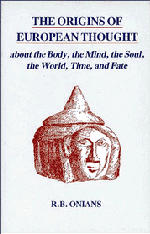Book contents
- Frontmatter
- Contents
- Preface to the first edition
- Preface to the second edition
- Introduction: The Earliest Greeks
- PART I THE MIND AND THE BODY
- PART II THE IMMORTAL SOUL AND THE BODY
- PART III FATE AND TIME
- Chapter I ‘On the Knees of the Gods’
- Chapter II Πείρατα
- Chapter III Καιρός
- Chapter IV The Weaving of Fate
- Chapter V Other Peoples—Fate and Magic
- Chapter VI Μοῖραν ἐπιτιθέναι, πεπρωμένος, etc.
- Chapter VII ʿΥπὲρ μόρον and the Relation of the Gods of Fate
- Chapter VIII The Jars of Zeus, the Scates of Zeus, and the Κῆρες
- Chapter IX Time—Ἦμαρ
- Chapter X Lachesis, Klotho, and Atropos
- Chapter XI Phases of Body and Mind, Sorrow, Sleep, Death, etc.
- Chapter XII Τέλος
- ADDENDA
- Indexes
- Frontmatter
- Contents
- Preface to the first edition
- Preface to the second edition
- Introduction: The Earliest Greeks
- PART I THE MIND AND THE BODY
- PART II THE IMMORTAL SOUL AND THE BODY
- PART III FATE AND TIME
- Chapter I ‘On the Knees of the Gods’
- Chapter II Πείρατα
- Chapter III Καιρός
- Chapter IV The Weaving of Fate
- Chapter V Other Peoples—Fate and Magic
- Chapter VI Μοῖραν ἐπιτιθέναι, πεπρωμένος, etc.
- Chapter VII ʿΥπὲρ μόρον and the Relation of the Gods of Fate
- Chapter VIII The Jars of Zeus, the Scates of Zeus, and the Κῆρες
- Chapter IX Time—Ἦμαρ
- Chapter X Lachesis, Klotho, and Atropos
- Chapter XI Phases of Body and Mind, Sorrow, Sleep, Death, etc.
- Chapter XII Τέλος
- ADDENDA
- Indexes
Summary
Ζεὺς μὲν ἄρα Τρώεσσι καὶ ῞Εκτορι βούλετο νίκην,…
ʾΑργείους δὲ Ποσειδάων ὀρόθυνε μετελθών,…
τοὶ δʾ ἔριδος κρατερῆς καὶ ὁμοιΐου πτολέμοιο
πεīραρ ἐπαλλάξαντες ἐπʾ ἀμϕοτέροισι τάνυσσαν,
ἄρρηκτόν τʾ ἄλυτόν τε, τὸ πολλῶν γούνατʾ ἔλυσεν.
‘This highly-wrought metaphor’, explains Monro, ‘is suggested by the Homeric use of τανύω and kindred words to express the “tension” or “strain” of an equal combat. The contest in which the two armies are joined (ὁμὸν νεĩκος, line 333) is spoken of as a piece of rope (πεĩραρ) passed over both by the two gods (ἐπαλλάξαντες) and drawn tight (τάνυσσαν), by which accordingly they are knit together inseparably. For the notion of a god stretching or drawing tight a battle, cf. XI, 336, ἔνθα σϕιν κατὰ ἶσα μάχην ἐτάνυσσε Κρονίων; XIV, 389 f., δή ῥα τότʾ αἰνοτάτην ἔριδα πτολέμοιο τάνυσσαν/κυανοχαĩτα Ποσειδάων καὶ ϕαίδιμος ῞Εκτωρ.ʾ But it is somewhat difficult to conceive how a rope stretched over two armies can ‘knit them inseparably together’ or indeed—a different image—how two armies pressing in upon each other can be compared to a taut rope the tendency of whose two ends is to part. Further, the rope is itself variously qualified by genitives, πτολέμοιο, ἔριδος, νίκης, ὀλέθρου, etc., qualifications which show that the tension of war as root conception is inadequate. Indeed the governing notion of τανύειν, here as more often in Homer even in the passages cited by Monro, would seem to be not that of ‘tension’ or ‘strain’, but rather that of ‘extending, spreading out’.
- Type
- Chapter
- Information
- The Origins of European ThoughtAbout the Body, the Mind, the Soul, the World, Time and Fate, pp. 310 - 342Publisher: Cambridge University PressPrint publication year: 1988

